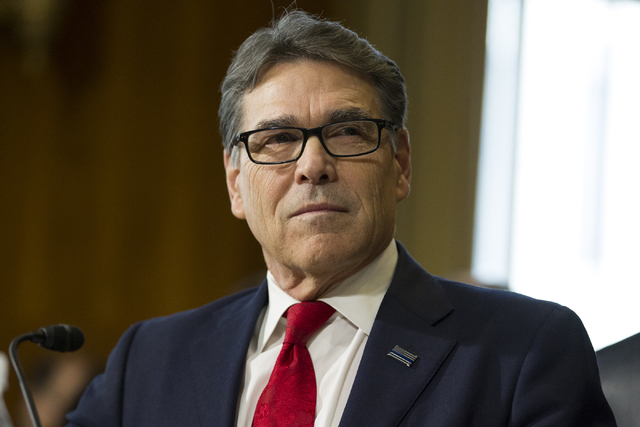Perry backs Yucca Mountain, proposes an interim waste storage site in Nevada

WASHINGTON — Energy Secretary Rick Perry defended a $28 billion budget proposal Tuesday, citing the need for $120 million to restart licensing of the Yucca Mountain nuclear waste project and develop interim storage that could include the Nevada National Security Site.
Nevada Gov. Brian Sandoval, a Republican, said the suggestion of the Nevada National Security Site was a “complete blindside” by the energy secretary and a plan that is “ill-conceived, irresponsible and likely illegal.”
Perry told the House Appropriations subcommittee on energy that proposed funding for Yucca Mountain would accelerate the fulfillment of the federal government’s obligation to permanently dispose nuclear waste from power plants nationwide.
The energy secretary said the country has a “moral obligation” to move nuclear waste from 120 sites in 39 states to a safe, permanent storage repository despite the controversy surrounding Yucca Mountain.
“I understand this is a politically sensitive topic for some,” Perry told the panel, “but we can no longer kick the can down the road.”
The $120 million for Yucca Mountain is contained in President Donald Trump’s blueprint for fiscal year 2018, which begins Oct. 1.
Perry said $110 million of the budget request to address nuclear waste would go to restart Nuclear Regulatory Commission licensing activities for Yucca Mountain, maintenance of the site and funds for technical, scientific and legal support.
The budget request would also include $10 million to initiate an interim storage program. Perry said those interim sites could include storage in New Mexico, Texas and the Nevada National Security Site, formerly the Nevada Test Site, which Perry said “has the potential to do that as well.”
It is the first time that Perry has mentioned interim storage in Nevada.
Sandoval stands firm
The Nevada National Security Site, a former testing area for nuclear devices, and Yucca Mountain, are both located in Nye County, northwest of Las Vegas.
Sandoval said using the test site for temporary storage “is a prime example of federal overreach and Nevada will pursue every legal option at our disposal.
The governor said not even the most-fervent pro-Yucca supporters have suggested the test site as a storage alternative.
“Let me be clear, no part of Nevada will be home to the world’s most toxic waste and we will fight every effort that puts our citizens at risk,” Sandoval said.
Facilities or sites for temporary storage of nuclear material or waste would also need to receive a license through the NRC, a process that can take several years.
Congress designated Yucca Mountain as the nation’s permanent repository for nuclear waste in 1987. Since then, the Department of Energy has spent $15 billion to develop and study the site. President Barack Obama defunded the program in 2012.
Rep. Mike Simpson, R-Idaho, the chairman of the House Appropriations subcommittee on energy, said he was “pleased that this budget request proposes appropriate funding for Yucca Mountain.”
“The previous administration made the costly — and wrong — decision to abandon Yucca’s license application, changing course on this program and ignoring the law,” Simpson said.
Simpson also said he applauded the department’s focus on interim storage. He said a bill being crafted in the Senate by Sen. Lamar Alexander, R-Tenn., was expected to address the need to move forward quickly on interim storage sites.
Asked after the hearing about the Nevada National Security Site as a place for interim storage, Simpson said that’s “the first time I’ve heard that.”
Asked if it raised eyebrows, Simpson said it probably did in Nevada.
Lawmakers respond
Indeed, response from Nevada lawmakers, following the hearing, was quick.
“Rick Perry’s moral compass is pointing in the wrong direction,” said Rep. Dina Titus, D-Nev.
“To add insult to injury, Perry went into unchartered territory by suggesting that he wants to build interim storage facilities in our state,” Titus said. “Perry’s position is unprecedented, unethical and immoral.”
“Secretary Perry’s comments today are irresponsible, reckless, and show a blatant disregard for the state of Nevada,” said Sen. Dean Heller, R-Nev. “As I have repeatedly told the Secretary, Nevada will not serve as our nation’s nuclear waste dump.”
“This is another poor attempt by an Administration hell-bent on ignoring one simple fact — Nevadans do not support the dumping of nuclear waste in our state,” said Rep. Ruben Kihuen, D-Nev. “Suggesting that the Department of Energy should double down on a flawed plan by storing waste on a short-term basis at the Nevada National Security Site is truly shortsighted and offensive.”
The state of Nevada has filed over 200 contentions to the DOE license application on Yucca Mountain citing safety concerns, many involving groundwater and transportation issues.
Nevada has denied the federal government a water permit for Yucca Mountain, an issue that prompts states’ rights arguments if the federal government moves forward.
Perry told the appropriations subcommittee that his first trip as energy secretary was to Yucca Mountain to talk with people who had worked on the project and tour the site.
“That is the proper place for long-term storage,” Perry told the panel.
He also noted that every one of the lawmakers on the appropriations subcommittee are in states where nuclear waste is being stored at power plants, and not properly stored.
Perry told the lawmakers it is their citizens who would have the most to lose if the waste remains in their states or congressional districts.
Rep. Ken Calvert, R-Calif., told Perry that lawmakers were going to do “do all we can” to solve the Yucca Mountain stalemate.
Perry is scheduled to appear before the Senate Appropriations subcommittee on energy Wednesday.
Contact Gary Martin at 202-662-7390 or gmartin@reviewjournal.com. Follow @garymartindc on Twitter.
RELATEDNevada officials face challenge stopping revival of Yucca Mountain
Nevada Senate vote sends Yucca Mountain resolution to Congress












